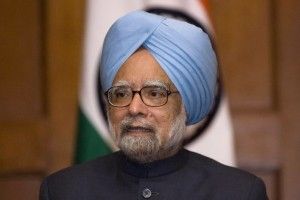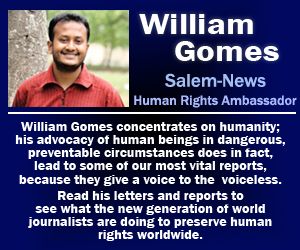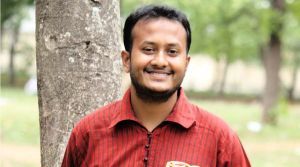
Publisher:
Bonnie King
CONTACT:
Newsroom@Salem-news.com
Advertising:
Adsales@Salem-news.com

~Truth~
~Justice~
~Peace~
TJP
May-17-2012 22:28

 TweetFollow @OregonNews
TweetFollow @OregonNews
INDIA: Three Men Tortured and Killed in Controversial Encounter with 23rd Assam Rifles
Letter by William Gomes Salem-News.comHuman Rights Ambassador William Nicholas Gomes writes to the Prime Minister of India over military murders of surrendered combatants.
 Dr. Manmohan Singh, Prime Minister of India |
(SALEM) - Another letter of appeal over appalling treatment of human beings in India; this one worse than most; the murder of surrendered disarmed prisoners. Like the infamous 'white flag killings' during the conclusion of the recent civil war in Sri Lanka, surrendered combatants were lured into laying down arms and turning themselves into government authorities in an effort to end violence, only to be killed for allegedly attacking Indian armed forces with the very weapons that were turned in as part of their surrender.
 |
Even worse, a major in the 23rd Battalion, Assam Rifles (23AR) of the Indian Army, brokered the deal for the surrender with the father of one of the three men killed.
It happened less than ten days ago. A captain who has since been promoted to major, by the name of Hanuman, with the 23rd AR, requested a meeting with a 70-year old village elder named Laishram Shyamkishore, of Tunukhong Awang Leikai. Mr. Shyamkishore was asked to persuade his son, Mr Laishram Nobin (alias Khuman) and his son’s friends to surrender themselves and live in peace. Shyamkishore believed this officer was telling the truth, and he secretly made arrangements for his son and his friends to surrender before the state authorities.
The handing over of weapons; an M-16 rifle, one Lethode gun, 50 live rounds of ammunition and three Lethode bombs, was witnessed by Khuman's father, Shyamkishore, prior to the surrender. He knew his son and two friends, now in custody, were disarmed. Yet shortly after this, the three were killed and identified in a morgue. The military claimed that they waged an attack with the very weapons they were witnessed turning over as part of their surrender.
| “ |
I am William Nicholas Gomes, Human Rights Ambassador for Salem-News.com. I am writing to express concern regarding yet another case of custodial violence and extrajudicial killing of (i) Mr. Laishram Nobin, (ii) Mr. Ningthoujam Ingocha and (iii) Mr. Irengbam Roshan, allegedly by the 23rd Battalion, Assam Rifles (23AR) under the command of Maj. Hanuman posted near Maphou Dam, Nongdam Village, Ukhrul District, Manipur, India. On 8 May 2012, Major Hanuman (then Captain) of 23rd AR approached and requested Mr Laishram Shyamkishore (70 years old), village elder of Tunukhong Awang Leikai, Imphal East District, Manipur, to persuade his son, Mr Laishram Nobin (alias Khuman) and his son’s friends to surrender themselves and live in peace. Shyamkishore considered the possibility and secretly made arrangements for his son to surrender himself before the state authorities. It was reported that, at the instructed and arrangement of Maj. Hanuman, Shyamkishore accompanied his son to the meeting place where Nobin was supposed to surrender himself. This meeting did not materialise. On 9 May 2012 at 7.30am, Shyamkishore, his son and two friends met Maj. Hanuman at Hidalok, which was approximately half a kilometer away from the bus stop at Loupheng village near Maphou Dam under Litan Police Station. They were wearing track suits (civilian clothing). Shyamkishore witnessed the three men hand over an M-16 rifle, one Lethode gun, 50 live rounds of ammunition and three Lethode bombs as a symbol of formal surrender to the 23rd AR. Maj. Hanuman expressed happiness at their peaceful surrender and asked Shyamkishore to return home in peace, so Shyamkishore returned home that same morning. On 10 May 2012, local daily newspapers reported that three underground suspects had been shot to death in an encounter with 23rd AR personnel. The conflict was stated to have lasted an hour and to have been near Chadong Tangkhul Village under Litan Police Station around 11am. The 22rd AR personnel were reported to have found the three dead bodies in the aftermath of the encounter. The force also recovered an M-16 with a grenade launcher, magazine and 55 live rounds, one 9mm carbine, magazine with three live rounds, one Lethode gun with three rounds and one fire case, one carry bad and one ammunition pouch. The 23rd AR also issued a statement claiming the deceased had been active in and around Maphou Dam, engaging in extortion and deliberately interfering with the construction of the Dam. The three bodies were handed over to the Litan Police Station. Shyamkishore became suspicious and anxious when he received news of the “encounter”. He immediately went to the Regional Institute of Medical Science (RIMS) Imphal morgue and was shocked to discover the bodies of his son and the two other men he had convinced to surrender to the 23rd AR the previous day. He was further surprised to find that the bodies were not in the dress the three men had been in just the previous morning. Instead of the track suits (civilian clothing), the three men were fitted out in camouflage fatigues. An examination of the bodies further revealed evidence of severe torture. Mr Irengbam Roshan’s body had been badly mutilated; his genitals had been crudely removed. One of Mr Ningthoujam Ingocha’s eyeballs had also been gouged out. Given the irreconcilability of the official account the 23rd AR had delivered to the media and the physical condition of the three bodies, the bereaved father, Shyamkishore, was convinced that the 23rd AR was responsible for such barbarous, morally reprehensible and illegal acts against his son and his son’s two friends. As such, Shyamkishore demands that stern legal measures should be taken against Maj. Hanuman and the other 23rd AR personnel involved. Shyamkishore demands this not only that justice is served and that the basest of all criminals and crimes are punished, but also that such cruelty does not persist or repeat itself in India. Despite losing so much, Shyamkishore is demonstrating an indefatigable hope and faith in believing his country may yet rise up against such crimes against her children and against humanity. A follow-up public meeting was held on 12 May 2012 at Tumukhong Youth Social Organisation in condemnation of the extrajudicial killings of these three civilians in the faked “encounter” with the 23rd AR. The community, disgusted with the violence and patent injustice, unanimously resolved to agitate against the AR in a show of solidarity with Shyamkishore. The meeting condemned the abuse of power and authority by the AR and its practices of torture and extrajudicial executions in the name of countering insurgencies. It denounced the deceitful and dishonorable dealings of the AR in first requiring the surrender of insurgents in the name of peaceful co-existence only to turn viciously on the men at their most vulnerable. Such practices breed distrust and moral contempt of the AR and only fuels existing tensions within the community. Demands were made at the meeting that Maj. Hanuman and other members of the 23rd AR responsible for these crimes be booked immediately and penalized according to the most stringent legal mechanisms available. The 23rd AR has in the meanwhile clarified that the media reports were all false and baseless. If this is true, the media has to also be investigated for fabricating stories and giving out misleading information. In any event, a full inquiry will have to be made into uncovering the exact events leading up the torture and death of these three men. The investigation should also consider that the three men had formally been in the custody of the 23rd AR since their surrender on the morning of 9 May. It is distressing to note the approximate coincidence between the inventory of items declared in the media and the arms the three men had surrendered in the morning on 9 May. It is even more disturbing to consider the possibility that the 23rd had thought it ethical to lure the men out with promises of peace and then mete out maltreatment and murder. Shyamkishore believed he was doing the right thing for the sake of the community, for justice and peace and for his son’s future when he reasoned with the three men to turn themselves in. He probably prevailed on them to do so out of their trust in and respect for Shyamkishore. The three men were ready to submit themselves to the law, to surrender also their weapons and to be held in custody; this also required respect for and immense faith in the judicial system. What was so particularly perverse was that Shyamkishore was instead unknowingly made complicit in his own son’s torture and murder, and the murder of his son’s friends. This utter betrayal by the very people who should be moral exemplars to civil society should trouble and grieve the Central Government over and beyond the dubious methods employed by the AR personnel, because the motivation, means and ends of law enforcement have been polluted by impunity and fear of such. The above case highlights several systemic faults in the administration of Manipur, and may be useful in pointing out larger issues plaguing India’s criminal justice system: 1. A non-compliance with state-wide Standard Operating Procedures (SOPs) and international standards governing the duty of law enforcement officers and agencies to treat prisoners humanely; 2. A lack of transparency and accountability in police proceedings against suspects that exposes civilians to human rights abuse (torture, summary executions/extrajudicial killings); 3. The shocking illegality and impunity which characterises the actions of law enforcement personnel in Manipur and many other states and districts in India; 4. Complicity of state-endorsed forces in crimes against humanity and human rights abuses, which in turn suggests: 5. Either an inability and/or unwillingness of the central government to control their paramilitary forces (due to lapses in communication or weaknesses in the chains of command issuing from the centre) The possibility for “effective remedy” has been seriously stymied with the extinguishing of the lives of these three men. Their most basic right to life has been irreversibly taken from them. Yet there is so much the authorities can do to bring closure to a grieving father and disillusioned community and to prevent such tragic events from repeating themselves. The Asian Human Rights Commission (AHRC) and other NGOs have documented substantial number of cases from India over the years that reflect critical fault lines in the face of India’s judiciary. Our argument is also that often, criminal investigation in India begins and ends with a forced confession extracted from a person in custody that then permits the law enforcement personnel and agencies to execute all manner of unreasonable, illegal or morally unconscionable acts of “punishment” against the victims. These acts usually include, but are not limited to, torture and other cruel, inhuman and degrading treatment, extrajudicial, summary or arbitrary executions, illegal detention for extended periods of time, extortion, rape and bodily mutilation. Such violent behaviour not only results from existing social tensions but is encouraged by immunity given by flawed statutes, such as the Armed Forces (Special Powers) Act, 1958. The widespread and systemic infringement of human rights by law enforcement officers across India breed a brutish brood of embittered bodies and constitute crimes against humanity. This bodes ill for India’s central government and future. The international arena is another area in which India is likely to suffer the consequences of not responding to human rights abuse. India has done a commendable job of ratifying a number of conventions – the International Covenant on Civil and Political Rights (ICCPR) in 1979, for instance. Article 6(1) asserts a fundamental human right to life which emphasises unequivocally the right to life first explicitly expressed in the Universal Declaration of Human Rights (UDHR) and emphasises the essentiality of law in enforcing and protecting this inherent right of man. Article 7 of the ICCPR also clearly says that the state has an obligation to ensure every man has a right against torture and cruel, inhuman or degrading treatment. Article 4(2) specifically lists these two rights among only seven that cannot be derogated from under any conditions. Insofar as the judiciary in India is not fully functional or, in certain cases, completely dysfunctional, the Indian state cannot hope to fulfill what was a binding agreement to uphold these basic rights. Unfortunately, India is still not a party to the Convention against Torture and Other Cruel, Inhuman and Degrading Treatment or Punishment (CAT). Ratifying the CAT would be another way the Indian state can express its commitment to protect the rights and liberties of its own people. It would also make India’s current resolutions and its membership to the ICCPR more credible to the international community. While civil society has already begun agitating on Shyamkishore’s behalf, little tangible difference can be made without the urgent intervention of the Central Government and from international actors. I therefore demand that: 1. The statement of Mr Laishram Shyamkishore is immediately taken and acknowledged by the relevant police authorities; 2. An immediate Judicial Inquiry or CBI Inquiry regarding the three victims’ deaths in accordance with the standing instructions of the National Human Rights Commission; 3. The Central Government assents to and initiates impartial prosecution in accordance to law of the accused AR officers; 3. Maj. Hanuman is tried separately for increased culpability as the leader of the 23rd AR; 4. The bodies of the three victims are released to their families for a proper burial at the earliest possible moment; 5. The 23rd AR subsequently issues a formal public apology for whatever misdeeds they have committed against the victims’, the victims’ families and the community; 6. Mr Laishram Shyamkishore is given some sort of compensation as further acknowledgement of Shyamkishore’s loss as well as to admit the injustice and violence committed against his son and the other two men; 7. Mr Laishram Shyamkishore is given protection against possible attack by personnel of the 23rd AR in light of the accusations he is bringing against them; 8. Shyamkishore, his family and the other two victims’ families receive a credible commitment from authorities to be protected against future violence and harassment; 9. The Union Home Minster and the Manipur Home Minister instruct all security forces, including the paramilitary, in Manipur and elsewhere to adhere strictly to the Supreme Court and National Human Rights Commission guidelines concerning “encounter killings”. Yours sincerely, William Nicholas Gomes Human Rights Ambassaor for Salem News.com |
” |
 Salem-News.com Human Rights Ambassador William Nicholas Gomes is a Bangladeshi journalist, human rights activist and author was born on 25 December, 1985 in Dhaka. As an investigative journalist he wrote widely for leading European and Asian media outlets.
Salem-News.com Human Rights Ambassador William Nicholas Gomes is a Bangladeshi journalist, human rights activist and author was born on 25 December, 1985 in Dhaka. As an investigative journalist he wrote widely for leading European and Asian media outlets.
He is also active in advocating for free and independent media and journalists’ rights, and is part of the free media movement, Global Independent Media Center – an activist media network for the creation of radical, accurate, and passionate telling of the truth. He worked for Italian news agency Asianews.it from year 2009 to 2011, on that time he was accredited as a free lance journalist by the press information department of Bangladesh. During this time he has reported a notable numbers of reports for the news agency which were translated into Chinese and Italian and quoted by notable number of new outlets all over the world.He, ideologically, identifies himself deeply attached with anarchism. His political views are often characterized as “leftist” or “left-wing,” and he has described himself as an individualist anarchist.
 |
 |
 |
Articles for May 16, 2012 | Articles for May 17, 2012 | Articles for May 18, 2012
Quick Links
DINING
Willamette UniversityGoudy Commons Cafe
Dine on the Queen
Willamette Queen Sternwheeler
MUST SEE SALEM
Oregon Capitol ToursCapitol History Gateway
Willamette River Ride
Willamette Queen Sternwheeler
Historic Home Tours:
Deepwood Museum
The Bush House
Gaiety Hollow Garden
AUCTIONS - APPRAISALS
Auction Masters & AppraisalsCONSTRUCTION SERVICES
Roofing and ContractingSheridan, Ore.
ONLINE SHOPPING
Special Occasion DressesAdvertise with Salem-News
Contact:AdSales@Salem-News.com

googlec507860f6901db00.html



Terms of Service | Privacy Policy
All comments and messages are approved by people and self promotional links or unacceptable comments are denied.
[Return to Top]
©2025 Salem-News.com. All opinions expressed in this article are those of the author and do not necessarily reflect those of Salem-News.com.